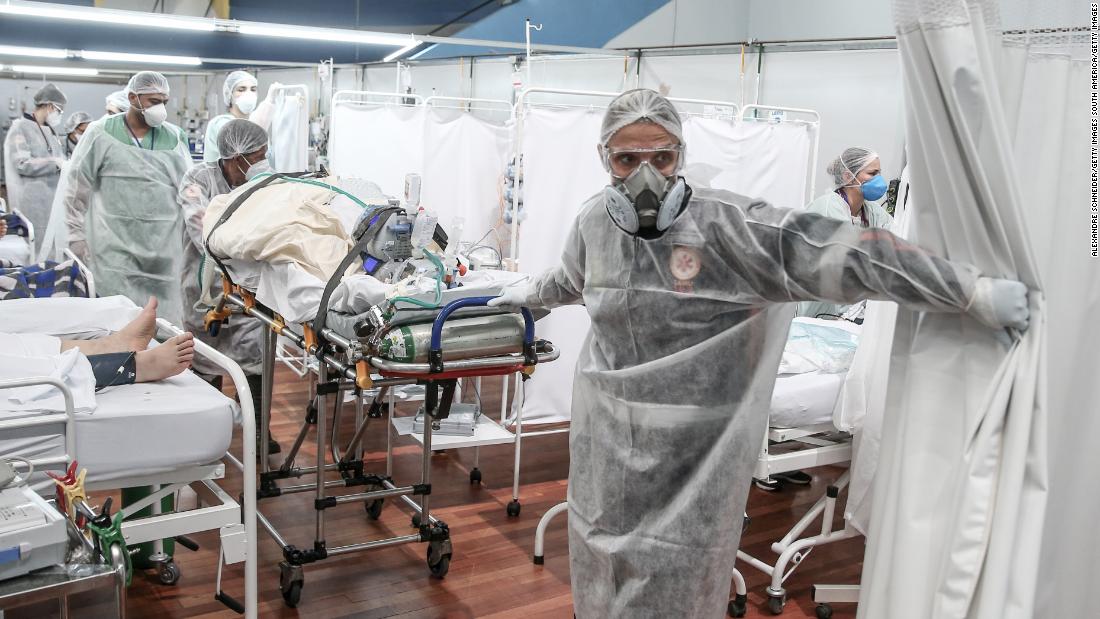
But these are not normal times. Few hospitals today have the space to receive new patients, even in Brazil’s richest and most populous state.
When Dineia Martins Firmino entered the hospital in early March, doctors intubated the 74-year-old and told her family that she urgently needed to be moved to an ICU for more advanced treatment, according to her granddaughter Pamela Rivitti, 30.
She never came off the official government-administered list for transfer. “No vacancy appeared when she needed it and she died on Saturday,” Rivitti said. “We held the funeral on Sunday.”
The fierce new wave of the coronavirus that claimed Firmino’s life is engulfing intensive care beds in São Paulo and across the country.
As of Sunday, 21 Brazilian states and the Federal District had an ICU occupancy rate of over 80%. Of these, 14 were about to collapse with an occupancy rate of more than 90%.
In the southern state of Rio Grande do Sul, ICUs are so overloaded that the largest public hospital treating Covid-19 cases in the capital, Porto Alegre, said on Sunday it had been forced to close its doors to new patients.
“The Covid ward of the hospital’s ICU already has an occupancy rate of 132%,” the hospital management of Porto Alegre Hospital das Clinicas said in a statement.
With full wards comes an increasing demand for oxygen and other basic needs. In the north, the state of Rondonia has an ICU occupancy of 97.6% and the attorney general’s office has warned that the local oxygen supply could run out in just two weeks.
Brazilian Health Minister Pazuello, who is currently himself under investigation for his handling of the Manaus crisis, recently estimated that 22 to 25 million doses would be available in March – a sharp drop from previous predictions that this month will reach 46 million doses of vaccine. would be available. .
The federal government is negotiating new vaccine deals, including a purchase order for the Russian-made Sputnik V. But shortages remain for now. In the coastal city of Rio de Janeiro, officials have already been forced to suspend the administration of first doses. The campaign will restart once more vaccines become available through Brazil’s Ministry of Health, Rio Mayor Eduardo Paes said.
With the daily death toll in the thousands, every hour that passes means lives are lost.
In a grim five-day period this month, a dozen Covid-19 patients died at Dr. Akira Tada Hospital. They were all on a waiting list to be transferred to an ICU.
Dr. Maria Dolores da Silva, an emergency doctor at the hospital, has never seen anything like it. A 42-year veteran of the Brazilian public health system, she doesn’t usually talk about her job, but in an interview with CNN, she bowed her head and cried thinking about the loss.
“It affects us psychologically,” said Dr. da Silva. “As much as we want to be strong, the feelings come to the surface because of so much suffering that we see.”
A local court intervened recently and ordered that at least 17 IC beds be made available awaiting transfer, noting São Paulo state’s public statistics, which claim that about 10% of IC beds in the region are still is available. The state is facing a $ 6,000 fine for each day it fails to provide beds to those patients.
But dozens of Dr. Akira Tada are still waiting to move for treatment. Sunday morning, a 13th patient who was waiting died.
As of Sunday evening, none of the remaining patients had been transferred.
Correction: This story has been updated to correct Dineia Martins Firmino’s age. She is 74. In an earlier version of the story, Pamela Rivitti’s last name was also misspelled.
CNN journalists Rodrigo Pedroso, Marcia Reverdosa and Matt Rivers reported from São Paulo. CNN’s Caitlin Hu reported from New York.